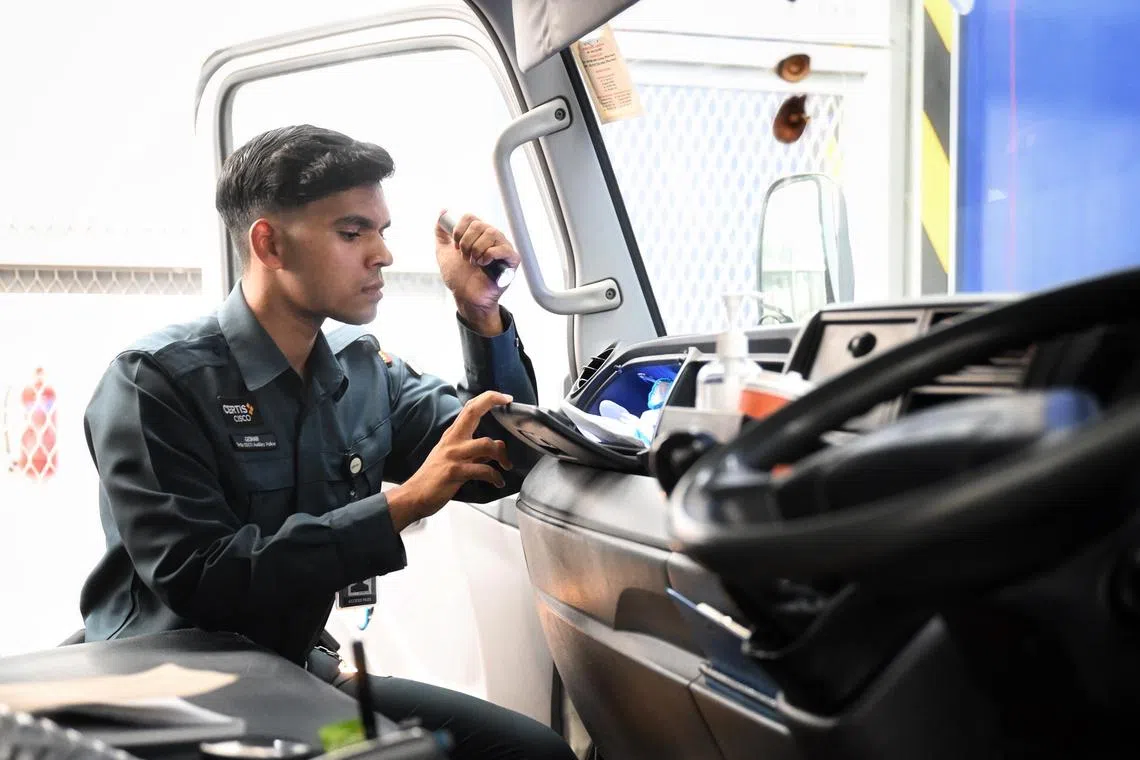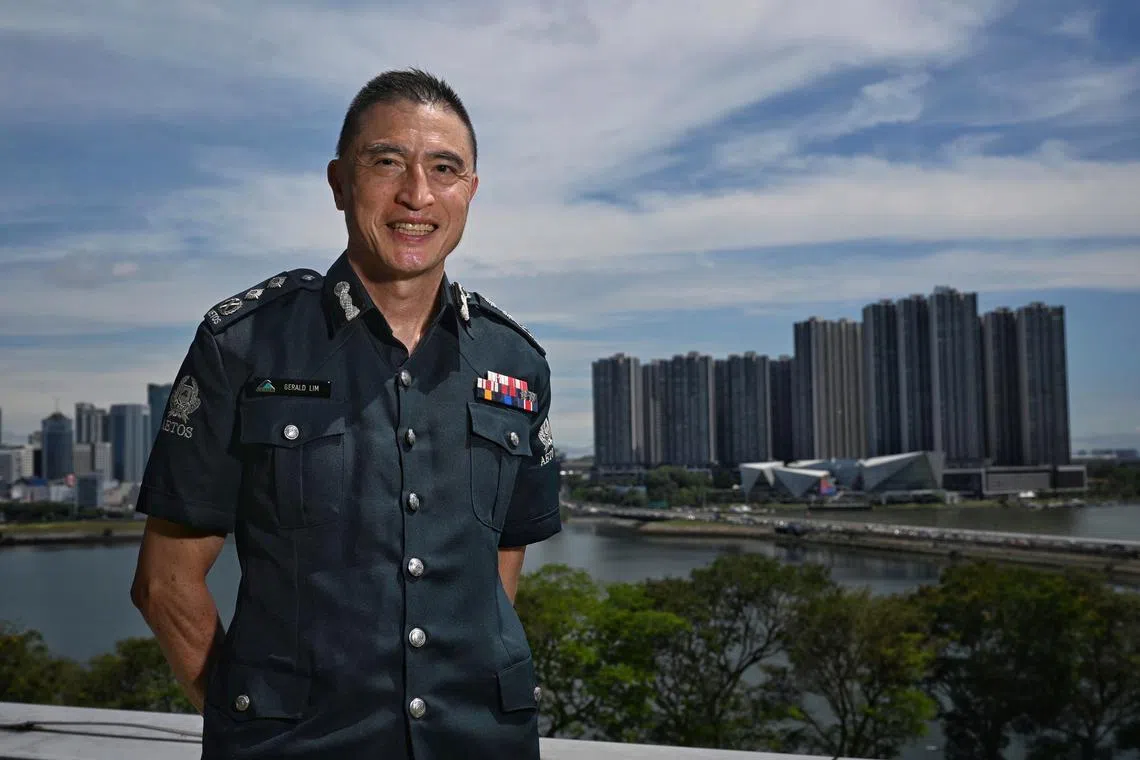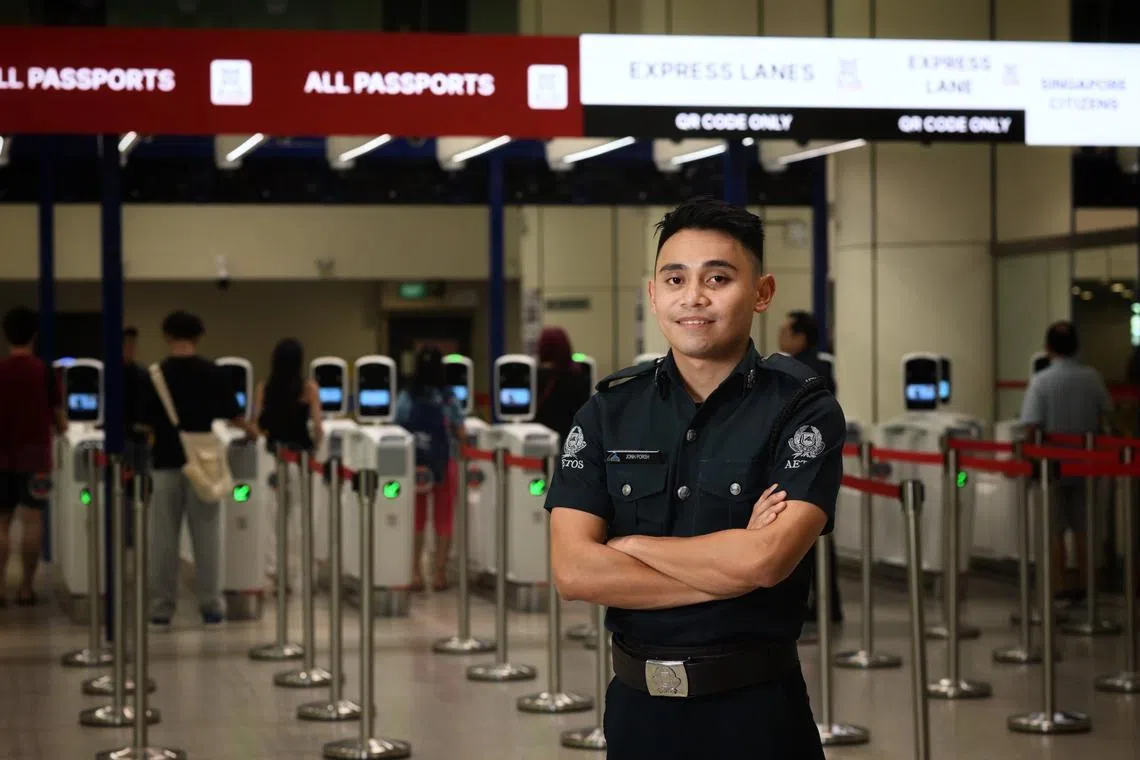‘I get to protect people’: Foreign auxiliary police officer on why he came to Singapore to work
Sign up now: Get ST's newsletters delivered to your inbox

Auxiliary police officer Geshan Nethmina Panagoda giving the green light to a vehicle after checking it at Changi Prison on April 3.
ST PHOTO: CHONG JUN LIANG
Follow topic:
SINGAPORE – As an auxiliary police officer (APO), Mr Geshan Nethmina Panagoda’s day begins at 7.30am.
The 23-year-old Sri Lankan is stationed inside Changi Prison Complex’s Cluster A, where he conducts security checks on vehicles entering the area. He has been working here since November 2024.
Mr Panagoda is one of the foreign APOs hired from new source countries – China, India, Myanmar, the Philippines and Sri Lanka – to beef up Singapore’s security sector.
On March 4, during the debate on the Ministry of Home Affairs’ (MHA) budget, Second Minister for Home Affairs Josephine Teo said the ministry would hire more foreigners to fill certain roles that Singaporeans might not be keen on.
She said there had been an increasing demand for security services, with the auxiliary police forces (APFs) facing challenges in sustaining an adequate pool of APOs. She said birth rates were declining and the competition for talent was very tough.
Singapore has been hiring Malaysian APOs since the 1970s, and Taiwanese APOs since 2017.
Mrs Teo added that it has been challenging recruiting and retaining APOs.
During an interview at Changi Prison on April 3, Mr Panagoda said he became an APO because of his interest in law enforcement and security.
His family relocated to Singapore in 2013 when his father wanted to start a freight forwarding company. They returned to Sri Lanka in 2024.
After completing his diploma in business administration, Mr Panagoda applied to become an APO in 2024 after seeing an online advertisement.
He said: “I had the option to work at my father’s company, but I chose to become an APO because I wanted to work in security.”
MHA said all APOs, regardless of nationality, must meet physical, education and probity requirements set by the Singapore Police Force, and are subject to security and financial screening.
Mr Panagoda attended a two-month stay-in programme at the Certis Corporate University, where he had to pass the APO basic course, an individual physical proficiency test and an English proficiency test.

After completing his diploma in business administration, Mr Geshan Nethmina Panagoda applied to become an auxiliary police officer in 2024 after seeing an online advertisement.
ST PHOTO: CHONG JUN LIANG
A few months in, Mr Panagoda said he enjoys his job and is used to the long hours.
He said: “I enjoy it because I get to contribute to Singapore’s security by protecting people and premises.”
MHA said that in cases where there might be cultural sensitivities associated with the deployment of APOs from different nationalities, the APFs are aware of the need to manage potential differences.
Said MHA: “APFs have rolled out initiatives to facilitate foreign APOs’ understanding and appreciation of our socio-cultural norms, sensitivities and laws. This includes briefings, visits to local places, regular engagements and appointing cultural liaison officers to support them.”
MHA said that as at end-January 2025, foreign APOs from the new source countries make up about 3 per cent of the APO workforce, and they are usually deployed in less public-facing functions.
Mr Zee Chong, senior vice-president and head of Certis’ physical security business, said deployment is usually based on clients’ needs and the nature of the assignment.
On why it was hard to recruit and retain APOs, Mr Chong said job seekers expect more flexibility in their working hours, which makes shift work less attractive despite the competitive remuneration.
New foreign APOs can earn a monthly gross salary of about $3,600.
Salaries are determined by the individual APFs, and are dependent on the candidate’s qualifications and skill sets, said an Aetos spokesperson.
Senior Assistant Commissioner of Police Gerald Lim, who leads the Aetos APF, said the challenging work environment could discourage new hires.
Citing the Woodlands Checkpoint, he said: “APOs have to work long hours and they have to deal with car fumes. Sometimes there are uncooperative motorists as well.”

Senior Assistant Commissioner of Police Gerald Lim, who leads the Aetos auxiliary police force, said the challenging work environment could discourage new hires.
ST PHOTO: CHONG JUN LIANG
Better job opportunities
Filipino Jonh Porsch Balicat Mabaquiao, 24, is an Aetos APO. He was influenced by his mother, who has been working in Singapore as a nurse for the past decade.
He said: “I saw her working very hard here and it inspired me to come to Singapore to seek better job opportunities.”
He said he had been running an online business in the Philippines and was living with his two brothers and their father.
A friend showed him Aetos’ APO recruitment advertisement and he applied for the job in May 2024.
During his three-month training stint, Mr Mabaquiao said he struggled with firearms training, which he found nerve-racking.
He said: “It was difficult, but the trainers were there to help us.”

Filipino Jonh Porsch Balicat Mabaquiao is an Aetos APO. He was influenced by his mother, who has been working in Singapore as a nurse for the past decade.
ST PHOTO: CHONG JUN LIANG
With their support, Mr Mabaquiao became a marksman.
When on duty, he is armed with a revolver, a baton and a pair of handcuffs. After his shift, he must return the equipment to the armoury within an hour, or an alarm will be triggered.
This is to prevent APOs from misusing firearms. The armoury also prohibits APOs from drawing weapons when they are off-duty.
Mr Mabaquiao’s duties at Woodlands Checkpoint include preventing people from trespassing on protected areas and ensuring travellers’ safety.
He alternates between the day and night shifts, which last 12 hours each.
Aetos helped Mr Mabaquiao find a rental room in Marsiling, which he shares with a colleague.
He regularly visits his mother, who lives in Marine Parade.
Mr Mabaquiao said: “Singapore is a very nice place. I appreciate the convenient transport system and the food. My colleagues are very friendly and we often go out for meals.”
Claudia Tan is a journalist at The Straits Times covering the crime and court beat.

